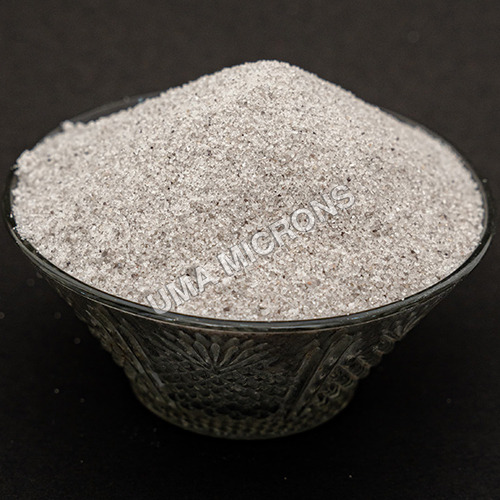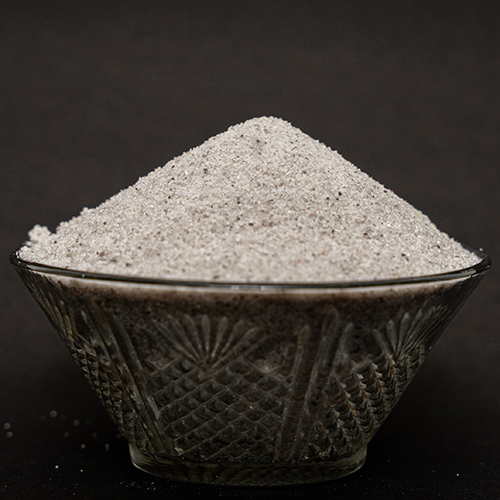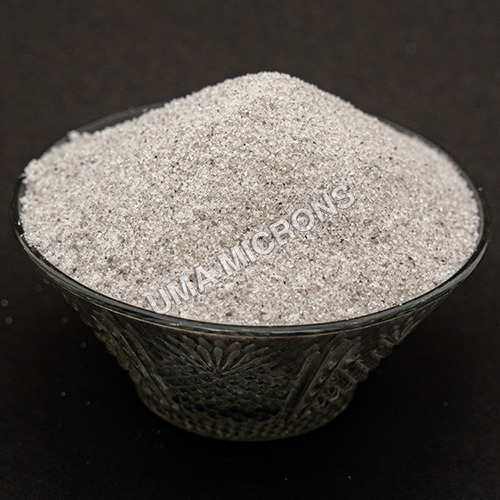Industrial Silica Sand
Industrial Silica Sand Specification
- Chemical Composition
- SiO (Silicon Dioxide)
- Surface Finish
- Fine
- Hardness (%)
- Mohs scale 7
- Density
- 2.6 Gram per cubic centimeter(g/cm3)
- Purity(%)
- 9599%
- Form
- Granule/Powder
- Usage & Applications
- Glass manufacturing, foundry casting, construction, water filtration
- Application
- Industrial
- Melting Point
- 1710C
- Water Absorption
- <1%
- Product Type
- Refractories
- Types of Refractories
- Basic Refractory
- Shape
- Granular/Powder
- Porosity
- Low
- Dimensional Stability
- Reversible
- Strength
- High
- Specific Gravity
- 2.65
- Thermal Conductivity
- Low
- Color
- White
- Moisture Content
- <0.5%
- Grain Size
- 0.11 mm
- Acid Resistance
- Excellent
- Bulk Density
- 14501550 kg/m
- pH Value
- Neutral (7)
- Heat Resistance
- Up to 1500C
- Radioactivity
- None detected
- Shelf Life
- Unlimited (when dry and stored properly)
- Loss on Ignition
- <1%
- Packaging Type
- HDPE Bags, Jumbo Bags
- Custom Sizing
- Available upon request
- Toxicity
- Non-toxic
Industrial Silica Sand Trade Information
- Minimum Order Quantity
- 100 Kilograms
- Payment Terms
- Cash in Advance (CID)
- Supply Ability
- 5000 Kilograms Per Month
- Delivery Time
- 7 - 10 Days
- Main Domestic Market
- All India
About Industrial Silica Sand
Our Industrial Silica Sand is a high-purity, finely graded sand that excels in a variety of applications, from construction to manufacturing. With superior particle size distribution and exceptional chemical consistency, it enhances the performance of products such as glass, ceramics, and concrete. Sourced from the finest natural deposits, it offers excellent durability and resistance to wear and tear. Ideal for use in foundries, filtration systems, and hydraulic fracturing, our silica sand meets stringent industry standards, ensuring reliability, strength, and versatility for both large-scale industrial operations and specialized processes. Quality you can trust, performance you can rely on.
Silica sand is one of the most abundant and widely used types of sand found across the globe. It serves a broad range of industrial and commercial applications. Generally, sand refers to granular material composed of finely divided rock and mineral particles, typically ranging in size from about one-sixteenth of a millimeter to two millimeters-positioned between silt and gravel in the grain size spectrum. The world contains many different types of sand, each with its own distinct composition and characteristics.
Silica, or silicon dioxide (SiO2), is a chemical compound commonly found in nature, with quartz being one of its most well-known crystalline forms. Silica sand is essentially quartz that has been weathered and broken down over time by the natural forces of wind and water into fine granules. These granules are highly versatile and are commonly found in many non-tropical regions around the world.
Silica sand is widely utilized in various industries due to its high purity and versatility. It is primarily used for water purification and in the manufacture of glass, synthetic foundry molding catalysts, and disodium ultramarine. Additionally, it plays a key role in producing acid and heat-resistant ceramics, refractories, pottery glazes, and enamels.
Silica sand with a mesh size of 150 is specifically used for sawing stone, grinding and surfacing glass, and polishing marble. Its rounded grains are ideal for sandblasting applications. Moreover, silica sand serves as a filler in paints, wood paste, molded hard rubber products, gypsum plasters, oxychloride acoustic plasters, and even in soap formulations.
High Purity and Performance
Composed of 9599%% pure silicon dioxide, this industrial silica sand maintains exceptional chemical stability and superior strength. Its precise grain size and low porosity ensure optimal performance in rigorous applications, ranging from glass production to foundry processes. The fine surface finish and high melting point support demanding industrial environments where consistency is essential.
Versatile Industrial Applications
Industrial silica sand is engineered for a range of uses, including water filtration, foundry casting, construction, and as a critical raw material in glass manufacturing. Its heat resistance (up to 1500C) and neutral pH provide flexibility for both basic and advanced refractory applications. The product is available in multiple packaging formats and can be custom-sized to meet unique requirements.
FAQs of Industrial Silica Sand:
Q: How is industrial silica sand used in glass manufacturing?
A: Industrial silica sand provides the primary source of silicon dioxide for glass manufacturing. Its high purity and precise granule size ensure clarity and strength in glass products, making it a preferred choice for glassmakers.Q: What benefits does this silica sand offer for foundry casting?
A: With excellent acid resistance, high strength, and low moisture content, this silica sand enhances mold stability and thermal resistance during metal casting. It helps produce accurate, high-quality castings with minimal surface defects.Q: When should I request a custom grain size for silica sand?
A: Custom grain sizes are recommended if your process or equipment requires specific particle dimensions for optimal performance. Custom sizing ensures compatibility with unique industrial applications or specialized filters.Q: Where should silica sand be stored to maintain its quality?
A: Silica sand should be stored in a dry location using HDPE or jumbo bags provided. Proper storage prevents moisture absorption and contamination, preserving its unlimited shelf life and purity.Q: What is the process for ensuring the sands acid resistance and purity?
A: The sand undergoes thorough washing and refined processing to reduce impurities and enhance acid resistance. Quality control measures verify that loss on ignition, moisture, and unwanted elements remain well below specified limits.Q: How does low thermal conductivity benefit industrial applications?
A: Low thermal conductivity in this silica sand helps improve energy efficiency and insulates against sudden temperature fluctuations, making it suitable for refractory linings and thermal barriers in high-temperature industries.


Price:
- 50
- 100
- 200
- 250
- 500
- 1000+
More Products in Industrial Silica Sand Category
Magnetized Silica Sand
Minimum Order Quantity : 100 Kilograms
Hardness (%) : Mohs Hardness 67
Thermal Conductivity : 1.3 W/mK (at 25C)
Density : 2.85 Gram per cubic centimeter(g/cm3)
Product Type : Refractories
Chemical Composition : SiO 95% min, FeO/Magnetite 25%

 Send Inquiry
Send Inquiry



 English
English Spanish
Spanish French
French German
German Italian
Italian Chinese (Simplified)
Chinese (Simplified) Japanese
Japanese Korean
Korean Arabic
Arabic Portuguese
Portuguese